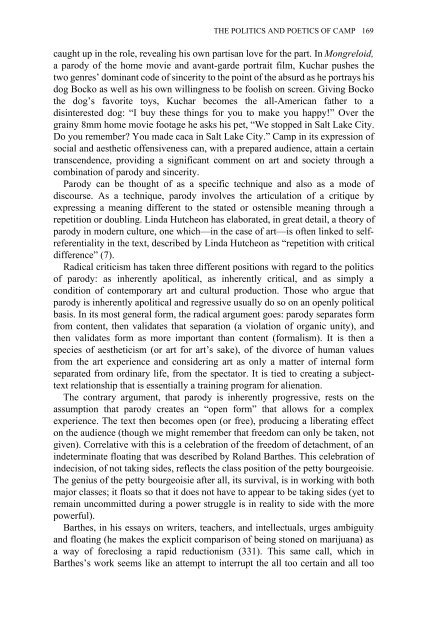Edited by Moe Meyer - Get a Free Blog
Edited by Moe Meyer - Get a Free Blog
Edited by Moe Meyer - Get a Free Blog
Create successful ePaper yourself
Turn your PDF publications into a flip-book with our unique Google optimized e-Paper software.
THE POLITICS AND POETICS OF CAMP 169<br />
caught up in the role, revealing his own partisan love for the part. In Mongreloid,<br />
a parody of the home movie and avant-garde portrait film, Kuchar pushes the<br />
two genres’ dominant code of sincerity to the point of the absurd as he portrays his<br />
dog Bocko as well as his own willingness to be foolish on screen. Giving Bocko<br />
the dog’s favorite toys, Kuchar becomes the all-American father to a<br />
disinterested dog: “I buy these things for you to make you happy!” Over the<br />
grainy 8mm home movie footage he asks his pet, “We stopped in Salt Lake City.<br />
Do you remember? You made caca in Salt Lake City.” Camp in its expression of<br />
social and aesthetic offensiveness can, with a prepared audience, attain a certain<br />
transcendence, providing a significant comment on art and society through a<br />
combination of parody and sincerity.<br />
Parody can be thought of as a specific technique and also as a mode of<br />
discourse. As a technique, parody involves the articulation of a critique <strong>by</strong><br />
expressing a meaning different to the stated or ostensible meaning through a<br />
repetition or doubling. Linda Hutcheon has elaborated, in great detail, a theory of<br />
parody in modern culture, one which—in the case of art—is often linked to selfreferentiality<br />
in the text, described <strong>by</strong> Linda Hutcheon as “repetition with critical<br />
difference” (7).<br />
Radical criticism has taken three different positions with regard to the politics<br />
of parody: as inherently apolitical, as inherently critical, and as simply a<br />
condition of contemporary art and cultural production. Those who argue that<br />
parody is inherently apolitical and regressive usually do so on an openly political<br />
basis. In its most general form, the radical argument goes: parody separates form<br />
from content, then validates that separation (a violation of organic unity), and<br />
then validates form as more important than content (formalism). It is then a<br />
species of aestheticism (or art for art’s sake), of the divorce of human values<br />
from the art experience and considering art as only a matter of internal form<br />
separated from ordinary life, from the spectator. It is tied to creating a subjecttext<br />
relationship that is essentially a training program for alienation.<br />
The contrary argument, that parody is inherently progressive, rests on the<br />
assumption that parody creates an “open form” that allows for a complex<br />
experience. The text then becomes open (or free), producing a liberating effect<br />
on the audience (though we might remember that freedom can only be taken, not<br />
given). Correlative with this is a celebration of the freedom of detachment, of an<br />
indeterminate floating that was described <strong>by</strong> Roland Barthes. This celebration of<br />
indecision, of not taking sides, reflects the class position of the petty bourgeoisie.<br />
The genius of the petty bourgeoisie after all, its survival, is in working with both<br />
major classes; it floats so that it does not have to appear to be taking sides (yet to<br />
remain uncommitted during a power struggle is in reality to side with the more<br />
powerful).<br />
Barthes, in his essays on writers, teachers, and intellectuals, urges ambiguity<br />
and floating (he makes the explicit comparison of being stoned on marijuana) as<br />
a way of foreclosing a rapid reductionism (331). This same call, which in<br />
Barthes’s work seems like an attempt to interrupt the all too certain and all too


